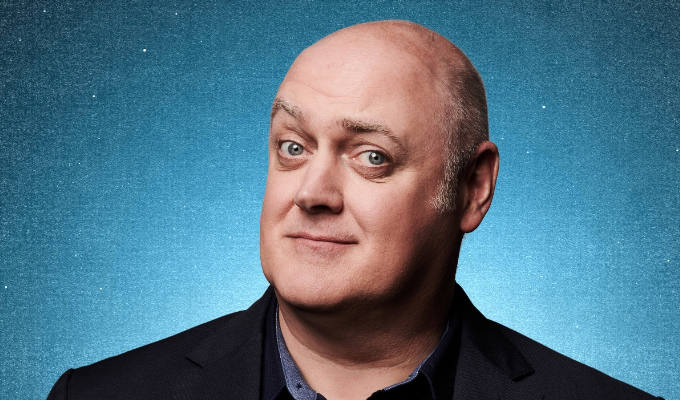Journalism for clowns
By Caimh McDonnell
So it was last week when Bonzo – head of the talky clowns union and editor of the Daily Chuckle called me into his office. He placed his big floppy-shoed feet up on his desk, looked at me with those big dead ‘one two many Christmas shows’ eyes and explained that ever since the Chuckle has gone daily, they’re really struggling to fill space.
‘We’ve already had 412 articles about how much Edinburgh costs and 98 depressingly similar articles about the lack of creativity in comedy,’ moaned Bonzo, ‘and now the aged comic who hasn’t stepped in a comedy club for twenty years has pulled out of writing his article about how all modern comics are lazy. We need something fresh!
‘I’m sending you on a journalism for idiots course and then you come back and tell us all about it.’ I did try and point out that The Daily Guffaw, Clown About Town, The Honker, The Rapey Openspot Gazette and Slapstick on Sunday had already done very similar articles, but by this point he’d become distracted by a pigeon outside his window.
So off I trotted with butterflies in my stomach to work on my second ever article, after ‘why you shouldn’t eat butterflies’ proved such a roaring success. My course was given by Hannah Hackington who described herself as ‘a wildly successful journalist who has decided to give up being wildly successful so she can concentrate on telling other people how to be wildly successful’.
It occurred to me that with five minutes on Google beforehand, I could’ve verified her credentials but that seemed like a lot of work and I don’t really do ‘research’. In fact, that was the first golden rule she gave us ‘don’t do research’ – it’s a lot of effort and scientists have probably proven that people don’t like facts.
In Hannah’s opinion, people only liked opinions. If you really have to use facts then keep them simple – like for example, if you need to know how much a journalist earns in a year – multiple the amount of copies their paper sold in a year by its price – and assume they make about half of that.
Hackington’s second rule was ‘context is everything’ – if you can take something out of context you can really fill up a lot of space by banging on and on about it. For example, go see an adult, talking to a room full of adults who’ve paid to see them do so, then take down one line they said in jest and treat it like a policy they are running for election on. While you can’t actually say this, if you think of everything anybody says in the context of how inappropriate it’d seem while being screamed in the face of a crying eight-year-old, that’d be ideal.
Rule three was ‘Protect your sources’. When quoting a member of the audience at a gig, where a person on stage said something that is a sure sign of everything going to hell in a handcart, protect the anonymity of the brave soul who is willing to speak out. All quotes should be attributed to ‘a member of the audience’, ‘a shocked member of the general public’ or ‘a person who was literally too beside themselves with grief at hearing these words to remember their own name’.
Always remember two things Hannah told us solemnly, anonymous members of a group of people are the voice of that group and that if necessary, you were also a member of that group. There’s nothing wrong with you anonymously quoting yourself saying what you would have said if you hadn’t been there asking people what they thought – you’re a person too.
If you really have to name somebody, remember that people like to see their names in the paper and are willing to play the game to achieve that. She’s right, as sure as my name is Caimh McDonnell and I have an Edinburgh show in the Tron at 6:20PM this year, that anonymous members of the audience who may have seen previews are already calling ‘Magnificent, a comedic tour de force’.
Which brought us to rule four, ‘controversies are like erections’ – in that, with a bit of imagination, a spot of fiddling and a quick trawl of the internet, they’re very easy to generate.
Say for example, a clown has the temerity to object to a member of the public filming their show – just because the theatre rules, the contract entered into with the purchase of the ticket and basic common decency state that they shouldn’t. You can really fill out an article with selected quotes from Facebook provided by the 2 per cent of people who think they’re entitled to do whatever they like, while ignoring the 98 per cent of people who actually get it.
An excellent companion piece to this would be to walk into ten shops at random, pick up an item and wander out with it again. When a shop assistant stops you and accusing you of stealing, calmly explain that you’re not stealing but rather you’re ‘bringing it home to show your mother’.
Once the shop assistant has apologised for bothering you, you can both have a jolly good laugh because, unlike anyone who through hard work and talent has become more successful than you, this guy has a sense of humour.
So there you have it, my article about how to write an article without having to go to much effort is done and dusted.
I know there are many journalists out there who do research things, work hard to understand their subject matter and aren’t looking for cheap sensationalism to fill space but ask yourself, what are those losers doing now? That’s right – thinking!
Whereas I am finishing a 1,000 word article. Now that I excel in both the fields of clowning and journalism, I’m what’s known as a ‘multi-platform’ talent – like Puff Daddy, I can do it all – only I’m not black obviously. OMG – Brainwave! For my next article, I’m going to black up, wander around Waitrose for a bit and then write about what it’s like to be a black person in Britain. Sweet!
- Caimh McDonnell is on Twitter at @Caimh.
Published: 20 Feb 2012






